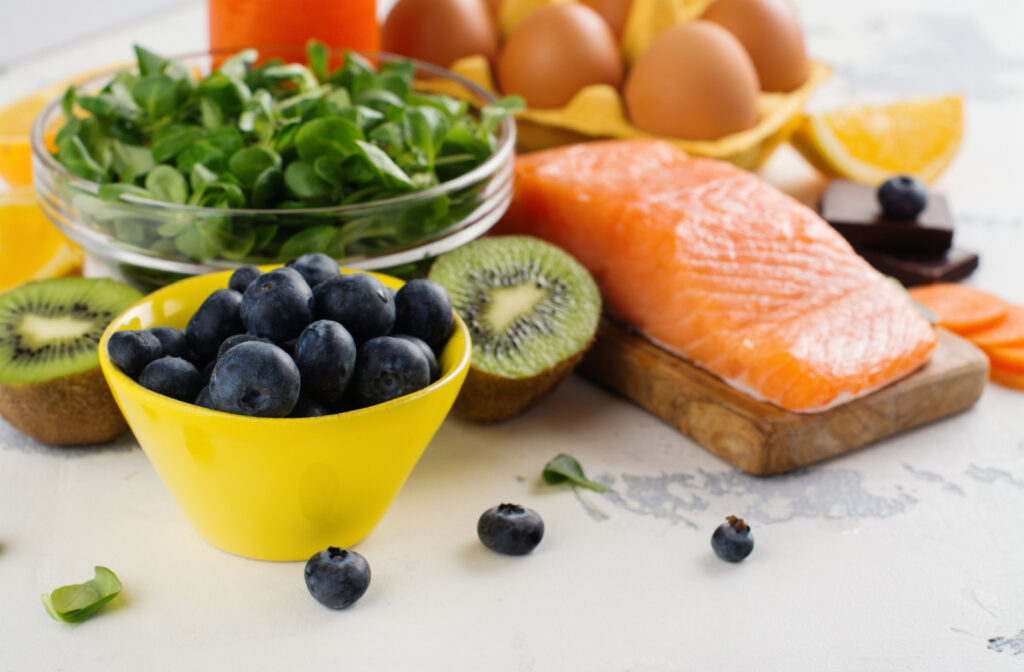Whether you’re gearing up for a Thanksgiving dinner, sitting down for a regular dinner with the family, or simply looking for a quick snack to grab while on the go, it’s important to keep in mind that the food you eat has a big impact on your health and your body. Your eyes and your vision are no exceptions! Just like many other parts of your body, you can actually improve the health of your eyes, or do your vision harm, simply by what you eat on a day-to-day basis.
These foods are rich in vitamins and minerals for vision. They will supplement the palate of your meal and also help you and your family maintain healthy eyes. Some may already have a spot reserved at your dinner table, but others might be a delightful surprise!

Carrots
Perhaps one of the best known foods that benefit eye health, carrots this holiday season will provide a rich serving of beta carotene and vitamin A, two nutrients that are key in eye health.
A fun historical fact: carrots became strongly associated with eye health during World War II, when the British Royal Air Force released a story that said a fighter pilot, John “Cateyes” Cunningham, had such strong night time flying visual prowess thanks to his steady diet of carrots. This led to a surge in carrot growing and eating. However, the story was actually a propaganda piece by the Royal Air Force to hide the fact that they were using the newly adapted radar technology to find planes!
Still, despite the Royal Air Force exaggerating the effect of carrots, the orange vegetable does offer plenty of nutrients important to eyes.
Leafy Greens
Packed full of lutein and zeaxanthin, leafy greens like kale or spinach gives your body the antioxidants that help combat the development of macular degeneration and cataracts. Lutein and zeaxanthin are unique in that they are part of a family of nutrients called carotenoids, and they’re the only carotenoids found in the lens of the eye. Not only do they defuse potentially damaging free radicals, they also absorb 40 to 90 percent of blue light intensity, meaning they serve like sunscreen for your eyes.
The human body does not produce either lutein or zeaxanthin, so the only way we get these nutrients is through diet. One cup of kale or spinach has more than 20 mg of those essential antioxidants! This Thanksgiving, consider mixing up what you mix up in your salads!
Berries
Although pumpkin pie reigns supreme during Thanksgiving, let’s not forget some of the other fruits and berries you could use. Strawberries, blackberries, blueberries area all rich in vitamin C which are great for eye health.
Oranges and Grapefruits
Also rich in lutein and zeaxanthin, oranges are a sweet alternative option if you or your family just aren’t big fans of leafy greens. Both oranges and grapefruits also are rich in vitamin C, which also contributes to reducing the risk of cataracts and age-related macular degeneration. There are 124 mg of vitamin C in one cup of orange juice, and 94 mg in a cup of grapefruit juice – so drink up!
Eggs
You just got another good excuse to devour your aunt’s platter of deviled eggs. Egg yolks are also rich in lutein and zeaxanthin, as well as zinc, which also contributes to lowering the risk of macular degeneration.
Almonds
High in vitamin E, almonds are a perfect snack and topper to your holiday meal. Just a handful of almonds gives you half of your daily dose of required vitamin E!
Other Nuts
Nuts – not just your nickname for that one weird uncle. Sunflower seeds and peanuts all are rich in vitamin E, which protects cells in eyes from free radicals. Peanut butter is a great and easy source of vitamin E, especially for picky kids.
Salmon, Mackerel, Anchovies, Trout
These fatty fishes are rich in DHA, a fatty acid that is needed for your retina. Low levels of DHA could be a cause of dry eye syndrome. Fatty acids also contribute to visual development and retinal function.
Oysters and Liver
Zinc helps contribute to sharper night vision (actually contribute, not “carrots make you see in the dark” contribute) and also help to stave off cataracts. Both oysters and liver (as well as red meat, poultry, and other shellfish) are rich in zinc.
For more ways to keep your eyes healthy, be sure to check out our Guide to Healthy Eyes in 2015. No matter the time or situation, though, consider enjoying these foods as part of your daily diet, and do good for your eye health as well! And when it comes time to schedule your regular eye exam, call the Eye Care Center of Colorado Springs at (719) 576-5844 or schedule an appointment online!


